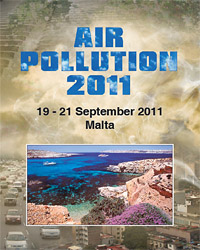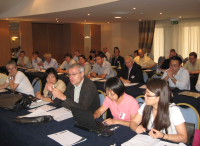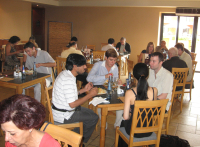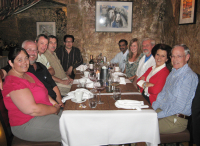Air Pollution 2011
19th International Conference on Modelling, Monitoring and Management of Air Pollution
19 - 21 September 2011
Malta
Overview
 The 19th International Conference on Modelling, Monitoring and Management of Air Pollution has recently taken place in Malta, organised by the University of the West of England, represented by Professor Jim Longhurst, and the Wessex Institute of Technology, represented by Professor Carlos A Brebbia.
The 19th International Conference on Modelling, Monitoring and Management of Air Pollution has recently taken place in Malta, organised by the University of the West of England, represented by Professor Jim Longhurst, and the Wessex Institute of Technology, represented by Professor Carlos A Brebbia.
The Air Pollution conference series has attracted outstanding contributions from leading researchers from around the world. The presented papers have been permanently stored in the Wessex Institute eLibrary as Transactions of the Wessex Institute (see http://library.witpress.com).
Despite the long history of attempts to manage the consequences of air pollution, it remains one of the most challenging problems facing the international community. Air pollution is widespread and growing in importance and has clear and known impacts on health and the environment. The human need for transport, manufactured goods and services brings with it often unintended but nevertheless real impacts on the atmospheric environment at scales from the local to the global. Whilst there are good examples of regulatory successes in minimising such impacts, the continuing development of the global economy brings new pressures upon the ability of the atmosphere to process pollutants and to safely remove them. When the chemical processing systems of the atmosphere become overloaded and the systems are unable to process inputs to the atmosphere at the rate they are added then pollution results. This brings risks to human health and the environment. The willingness of governments to regulate air pollution is often balanced by concerns over the economic impact of such regulations. This frequently results in a lag between the scientific knowledge about the nature, scale and effect of air pollution and the implementation of appropriate, targeted and timely legislation.
Science remains the key to identifying the nature and scale of air pollution impacts and is essential in the formulation of policy to produce information for regulatory decision making.
Continuous improvements to our knowledge of the fundamental science of air pollution and its applications are necessary if we are to properly predict, assess and mitigate the air pollution implications of emissions to the atmosphere. Science must also be able to provide the evidence of improvements to air quality that result from implementation of the mitigation measures or the control regulation.
The ability to assess and mitigate many of the precautionary principles is a challenge that science must grasp and position itself to convince decision makers that uncertainty does not mean inertia. The outcome of such activities must be peer-reviewed but they must also be translatable into a suitable format to assist policy makers in reaching sustainable decisions and to build public acceptance and understanding of the nature and scale of the air pollution problem.
The conference brought together contributions from scientists from around the world to present recent work on various aspects of the air pollution phenomena.
Opening of the Conference
 Professor Carlos A Brebbia, Director of the Wessex Institute of Technology (WIT) opened the meeting, explaining the reason behind the organisation of the WIT series of conferences. The Institute – Professor Brebbia said – aims to provide a mechanism for the transfer of knowledge at an international level. This is carried out through many different training and research activities, plus the organisation of scientific conferences in different location around the world.
Professor Carlos A Brebbia, Director of the Wessex Institute of Technology (WIT) opened the meeting, explaining the reason behind the organisation of the WIT series of conferences. The Institute – Professor Brebbia said – aims to provide a mechanism for the transfer of knowledge at an international level. This is carried out through many different training and research activities, plus the organisation of scientific conferences in different location around the world.
Air Pollution is one of the twenty five or so meetings organised by WIT each year, and its evolution over the last twenty years has demonstrates the importance of the type of interdisciplinary and international character of conferences presented by WIT.
Professor Brebbia also referred to the commitment of WIT to work in close collaboration with industry and focusing on the solution of practical engineering or scientific problems. WIT has developed unique computational techniques to solve a wide variety of fluid, structural design, electromagnetics and other problems. The Institute is recognised for the development of the Boundary Element method developed by Professor Brebbia's group during his time at Southampton University.
Keynote Addresses
The conference opened with a keynote speech by Professor Jim Longhurst entitled ‘Towards a new framework for air quality management in Nigeria’ which discussed the developments taking place to reduce the atmospheric impact of various sources of pollution, with particular reference to those resulting from the oil and gas industry. The paper outlined the different and important elements which should be considered in order to achieve required institutional, organisational structures and capacity in Nigeria.
The other keynote address was delivered by Professor Carlos Borrego of the University of Aviero in Portugal. Professor Borrego is widely known throughout the world for his work in air pollution which led to his appointment as Scientific Advisor to the President of Portugal. His talk was entitled ‘Impact of urban planning alternatives on air quality: URBAIR model application’. The URBAIR model developed by Carlos Borrego’s group allowed a competitive analysis between the current situation and predefined planning alternatives, in terms of the number of exceedences of air quality thresholds and other parameters established in European legislation. The results provide important information to urban planners and policy makers to choose the best planning alternatives according to quality of life studies presented by the local authorities. The model was applied to studies of Helsinki, Athens and Gliwice drawing some critical comparisons
Invited Presentations
Other invited presentations were;
‘The use of mineral magnetic measurements as a particulate matter (PM) proxy for road deposited sediments (RDS): Marylebone Road, London’
by C. A. Booth, University of Wolverhampton, UK
‘A quest for April 2010 Eyjafjalla volcanic particles in PMx collected in the Czech Republic’
by E. Petrovský, Institute of Geophysics, Czech Republic
Conference Topics
The other papers were classified under the following themes;
- Air pollution modelling
- Monitoring and measuring
- Aerosols and particles
- Air quality management
- Emissions studies

- Health effects
- Innovative technologies
The delegates had ample opportunities for interaction and holding discussions in an informal setting. In addition to coffee breaks, they were offered complementary lunches which helped to bring the group together. This was reflected in the many discussions that took place outside of the conference room as well as following each presentation.
International Scientific Advisory Committee
 The International Scientific Advisory Committee met over dinner at a well-known restaurant to discuss the reconvening of the meeting in 2013 (notice that the 2012 conference has already been launched; it is to take place in A Coruña, Spain, from the 16-18 May 2012. Please see http://www.wessex.ac.uk/12-conferences/airpollution-2012.html). A series of new topics were discussed and approved for inclusion in the 2013 Call for Papers. Then came several suggestions of locations and venues for the conference and general agreement that it was necessary to reach new research groups around the world, without losing delegates from Europe which have supported the meetings since the beginning.
The International Scientific Advisory Committee met over dinner at a well-known restaurant to discuss the reconvening of the meeting in 2013 (notice that the 2012 conference has already been launched; it is to take place in A Coruña, Spain, from the 16-18 May 2012. Please see http://www.wessex.ac.uk/12-conferences/airpollution-2012.html). A series of new topics were discussed and approved for inclusion in the 2013 Call for Papers. Then came several suggestions of locations and venues for the conference and general agreement that it was necessary to reach new research groups around the world, without losing delegates from Europe which have supported the meetings since the beginning.
Excursions
The conference dinner took place after an excursion to the island of Gozo, where the delegates were taken by ferry. Once in Gozo, they were taken by bus to Rabat, the island’s capital, where a guide explained its history and showed the places of interest, including the Basilica and Cathedral in the old town. Then they proceeded to the renown citadel, the fortified town built after Gozo was depopulated in the 1500’s by slave traders. The citadel commands a unique view of the whole island and was most effective to protect the inhabitants during the tumultuous past. It was destroyed by an earthquake and never fully rebuilt. The delegates were also shown parts of the old town and some of the sights such as the Opera House and theatre which are witness to the rich cultural heritage of the small island.
At the end of the tour the delegates were taken to Masalforn, a coastal town with a picturesque harbour where they had an excellent dinner in a waterfront restaurant with exquisite local dishes and wines.
After dinner the delegates made their way back to the bus and ferry to take them back to the main island and hotel.
The evening was most enjoyable and helped to strengthen the links between participants.
Some of the delegates were able to take the opportunity to visit the University of Malta on a visit organised by the School of Engineering. There, they were shown the work taking place at the Department of Metallurgy and Materials Engineering. The University of Malta as a whole is keen to collaborate with other institutions around the world.
Closing Address
The closing speech at the meeting was presented by Mark Scerdi of the Department of the Environment of Malta, dealing with the topic of air quality in Malta. The number of cars in Malta has increased considerably in the last few years, with a comparatively new fleet. Other sources of pollution are frompower stations and some from maritime traffic. A different source of pollution is the dust carried by winds from the Sahara. Mark’s presentation was followed with great interest which gave an opportunity for substantial discussion.
Publication of Papers
The proceedings of Air Pollution XIX, 496pp (Print ISBN: 978-1-84564-528-1; Online ISSN: 1746-4498) are available in paper and digital format from WIT Press priced at £298/US$426/€298. Orders can be placed on the WIT Press web site at www.witpress.com or by email:
Papers from the conference will also be hosted online at the WIT eLibrary as Volume 147 of WIT Transactions on Ecology and the Environment (Online ISSN: 1746-4498). For more details visit the WIT eLibrary at http://library.witpress.com

 Wessex Institute
Wessex Institute